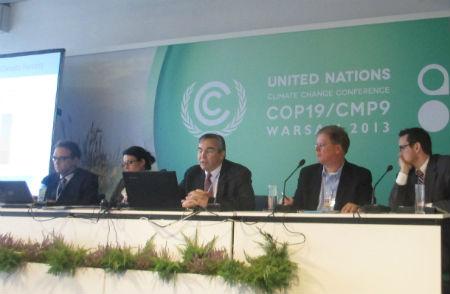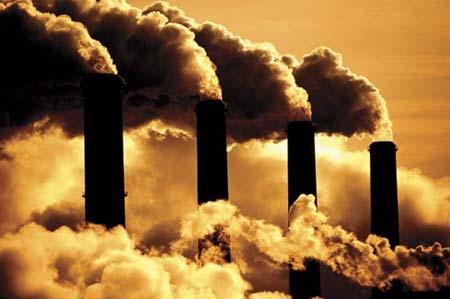By Andrea Rodríguez, legal advisor, AIDA, @arodriguezosuna, and Mónica Valtierra, AIDA volunteer
Warsaw, Poland - The reduction of hydrofluorocarbons (HFCs) and methane gas emissions has enormous potential to help in the fight against climate change under the framework of the Montreal Protocol and through the development of clean technologies designed to reduce greenhouse gas emissions from refrigerants, air conditioners and vehicles.
Mark W. Roberts, a senior counsel and international policy advisor at the Environmental Investigation Agency (EIA), made this point during Catalyzing Pre-2020 Mitigation Action – Phasing down HFCs and Reducing Methane Emissions event at the 19th Conference of the Parties (C0P19) to the United Nations Framework Convention on Climate Change (UNFCCC) in Warsaw, Poland. 
He reminded listeners that short-lived climate pollutants (SLCPs), which include HFCs and methane, may have a relatively short lifespan in the atmosphere but they have a global-warming potential (GWP)much greater than CO2. This means that action to reduce these particular pollutants will have substantial short-term climate benefits.
Among the activities to reduce of HFCs we have the use of ammoniums, hydrocarbons, methyl formats and other technologies that involve the sustainable use of CO2. He also suggested the implementation of alternative manufacturing processes for aerosols and fiber materials, the use of dry powder for asthma inhalers and the use of solar energy for refrigeration and air conditioners.
Roberts said the scope of the Montreal Protocol includes the reduction of 8 billion tonnes of CO2 since 1980, five times more than the goal established in the Kyoto Protocol between 2008 and 2012. The United States and Canada have proposed amendments to the Montreal Protocol that would help to dramatically reduce the consumption of HFCs, he added.
Along the same vein, the representative of the United Nations Industrial Development Organization (UNIDO) mentioned the importance of implementing the Montreal Protocol for the global reduction of HFCs. With regard to financing mechanisms, he said the Global Environment Facility (GEF) could be an alternative for developing countries without access to the Multilateral Fund for the Implementation of the Montreal Protocol.
He also highlighted UNIDO’s role in promoting new technologies based on ozone-friendly chemicals and improvements in manufacturing processes in developing countries. As an example of the latter, he cited a project in which 10 companies in the Philippines had reduced their use of HFCs by 10%. He also mentioned the recent launch of the Climate and Clean Air Coalition, which seeks to reduce HFCs emissions and put the reduction of SLCPs on the agenda. 
At the same time, Markus Kurdziel, a consultant for BMZ in Germany, spoke about projects the German government is working on with public agencies and the private sector for refrigerants, air conditioning and foam production.
These projects are part of Proklima, a program supported by 40 countries with the following areas of action: political consulting, technology transfer, research, subsidies development, technological adaptation, emissions reduction and the implementation of bilateral strategies.
As an example, Kurdziel mentioned projects in China and India where the governments there helped private companies in the manufacturing of air conditioners with 15% greater efficiency. In Brazil, the initiative implemented a program to recover and recycle refrigerators.
Also at the event, representatives of the International United Steelworkers Union said U.S. natural gas networks were leaking a combined total of around 6 million cubic feet of gas because of old and deteriorated pipes.
In response, David Foster of the Blue Green Alliance called for greater efforts to repair the pipes to prevent methane gas from escaping into the atmosphere, a project that he said would create millions of jobs in the United States.
The event closed with a message. We must take action to reduce methane and HFCs emissions -- and we must do it now.
For more information, see the document (in Spanish) about short-lived climate pollutants that AIDA, CEDHA, CEMDA and RedRacc presented at COP19.